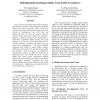Free Online Productivity Tools
i2Speak
i2Symbol
i2OCR
iTex2Img
iWeb2Print
iWeb2Shot
i2Type
iPdf2Split
iPdf2Merge
i2Bopomofo
i2Arabic
i2Style
i2Image
i2PDF
iLatex2Rtf
Sci2ools
HICSS
2006
IEEE
2006
IEEE
Modeling Initial and Repeat Online Trust in B2C E-Commerce
Prior research has demonstrated that the degrees and impact of customer trust on purchase intentions change with online experience. While online trust research has incorporated and built upon models and theories of interpersonal trust, swift trust, and impersonal trust, this line of research tends to examine initial and repeat online trust separately. Based on a dual processing model of persuasion – Elaboration Likelihood Model (ELM), this study attempts to provide one theoretical framework to examine customers’ formation of initial trust and repeat trust simultaneously. The model identifies motivation and ability to assess online vendor’s attributes as the key drivers to the formation of online trust attitude. These two factors, in combination, determine the salience of different information in influencing one’s trust attitude toward an e-vendor. Initial and repeat online transactions implied different levels of motivation and ability to deliberate vendor-related attributes, ...
Biometrics | HICSS 2006 | Initial Trust | Online Trust | System Sciences | Trust |
| Added | 11 Jun 2010 |
| Updated | 11 Jun 2010 |
| Type | Conference |
| Year | 2006 |
| Where | HICSS |
| Authors | Wei-Chang Kong, Yu-Ting Caisy Hung |
Comments (0)

